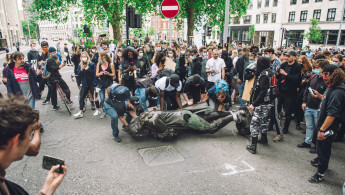UK slave trader's statue toppled in anti-racism protests
Footage shot by a witness showed a few dozen people tie a rope around the neck of Edward Colston's statue and bring it to the ground in the southwestern city of Bristol.
They then stamped on it for a few minutes before carrying it and heaving it into the harbour with a great cheer.
Colston's face got splashed with red paint at one point.
"Today I witness history," eye witness William Want tweeted.
"The statue of Edward Colston, a Bristol slave trader, was torn down, defaced, and thrown in the river. #BlackLivesMatter."
But interior minister Priti Patel called the toppling "utterly disgraceful" and the city's police promised to carry out an investigation.
"That speaks to the acts of public disorder that actually have now become a distraction from the cause which the people are actually protesting about," Patel told Sky News.
Read also: Amid crippling Israel blockade, Gaza factories roar back to life to make PPE
"That is a completely unacceptable act and speaks to the vandalism, again, as we saw yesterday in London."
The London police reported making 29 arrests during a day of largely peaceful protests Saturday that included a few scuffles with officers protecting the government district around Downing Street.
Bristol mayor Marvin Rees struck a more conciliatory tone than the one adopted by Patel.
"I know the removal of the Colston Statue will divide opinion, as the statue itself has done for many years," the mayor said in a statement.
"However, it's important to listen to those who found the statue to represent an affront to humanity."
'Good'
Local police chief Andy Bennett said around 10,000 people attended Bristol's "Black Lives Matter" demonstration on Sunday.
"The vast majority of those who came to voice their concerns about racial inequality and injustice did so peacefully and respectfully," the police chief said.
"However, there was a small group of people who clearly committed an act of criminal damage in pulling down a statue near Bristol Harbourside."
Colston grew up in a wealthy merchant family and joined a company in 1680 that had a monopoly on the west African slave trade.
The Royal African Company (RAC) was formally headed by the brother of King Charles II who later took the throne as James II.
The company branded the slaves - including women and children - with its RAC initials on their chests.
It is believed to have sold around 100,000 west Africans in the Caribbean and the Americas between 1672 and 1689.
Colston later developed a reputation as a philanthropist who donated to charitable causes such as schools and hospitals in Bristol and London.
His 18-foot (5.5-metre) bronze statue stood on Bristol's Colston Avenue since 1895. The city also has a school named in his honour.
The Guardian newspaper said a local petition to remove the statue had gathered 11,000 signatures by the weekend.
UK opposition Labour party lawmaker Clive Lewis welcomed its toppling by the crowd.
"Good," Lewis tweeted.
"Someone responsible for immeasurable blood & suffering. We’ll never solve structural racism till we get to grips with our history in all its complexity. #BLM"





 Follow the Middle East's top stories in English at The New Arab on Google News
Follow the Middle East's top stories in English at The New Arab on Google News


